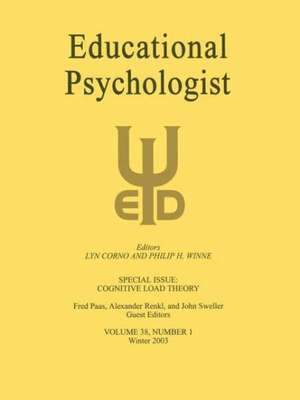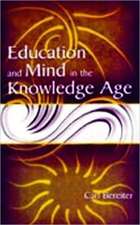Cognitive Load Theory: A Special Issue of educational Psychologist
Editat de Fred Paas, Alexander Renkl, John Swelleren Limba Engleză Paperback – feb 2003
| Toate formatele și edițiile | Preț | Express |
|---|---|---|
| Paperback (1) | 469.51 lei 6-8 săpt. | |
| Taylor & Francis – feb 2003 | 469.51 lei 6-8 săpt. | |
| Hardback (1) | 764.20 lei 6-8 săpt. | |
| Taylor & Francis – 14 dec 2016 | 764.20 lei 6-8 săpt. |
Preț: 469.51 lei
Nou
Puncte Express: 704
Preț estimativ în valută:
89.85€ • 97.57$ • 75.48£
89.85€ • 97.57$ • 75.48£
Carte tipărită la comandă
Livrare economică 22 aprilie-06 mai
Preluare comenzi: 021 569.72.76
Specificații
ISBN-13: 9780805896107
ISBN-10: 0805896104
Pagini: 78
Ilustrații: 1
Dimensiuni: 210 x 280 x 5 mm
Greutate: 0.15 kg
Ediția:1
Editura: Taylor & Francis
Colecția Routledge
Locul publicării:Oxford, United Kingdom
ISBN-10: 0805896104
Pagini: 78
Ilustrații: 1
Dimensiuni: 210 x 280 x 5 mm
Greutate: 0.15 kg
Ediția:1
Editura: Taylor & Francis
Colecția Routledge
Locul publicării:Oxford, United Kingdom
Public țintă
ProfessionalCuprins
Volume 38, Number 1, 2003
Contents: F. Paas, A. Renkl, J. Sweller, Cognitive Load Theory and Instructional Design: Recent Developments. J.J.G. van Merriënboer, P.A. Kirschner, L. Kester, Taking the Load off a Learner's Mind: Instructional Design for Complex Learning. A. Renkl, R.K. Atkinson, Structuring the Transition From Example Study to Problem Solving in Cognitive Skill Acquisition: A Cognitive Load Perspective. S. Kalyuga, P. Ayres, P. Chandler, J. Sweller, The Expertise Reversal Effect. P. Gerjets, K. Scheiter, Goal Configurations and Processing Strategies as Moderators Between Instructional Design and Cognitive Load: Evidence From Hypertext-Based Instruction. R.E. Mayer, R. Moreno, Nine Ways to reduce Cognitive Lad in Multimedia Learning. R. Brünken, J.L. Plass, D. Leutner, Direct Measurement of Cognitive Load in Multimedia Learning. F. Paas, J.E. Tuovine, H. Tabbers, P.W.M. Van Gerven, Cognitive Load Measurement as a Means to Advance Cognitive Load Theory.
Contents: F. Paas, A. Renkl, J. Sweller, Cognitive Load Theory and Instructional Design: Recent Developments. J.J.G. van Merriënboer, P.A. Kirschner, L. Kester, Taking the Load off a Learner's Mind: Instructional Design for Complex Learning. A. Renkl, R.K. Atkinson, Structuring the Transition From Example Study to Problem Solving in Cognitive Skill Acquisition: A Cognitive Load Perspective. S. Kalyuga, P. Ayres, P. Chandler, J. Sweller, The Expertise Reversal Effect. P. Gerjets, K. Scheiter, Goal Configurations and Processing Strategies as Moderators Between Instructional Design and Cognitive Load: Evidence From Hypertext-Based Instruction. R.E. Mayer, R. Moreno, Nine Ways to reduce Cognitive Lad in Multimedia Learning. R. Brünken, J.L. Plass, D. Leutner, Direct Measurement of Cognitive Load in Multimedia Learning. F. Paas, J.E. Tuovine, H. Tabbers, P.W.M. Van Gerven, Cognitive Load Measurement as a Means to Advance Cognitive Load Theory.
Descriere
The papers of this special issue demonstrate that cognitive load theory provides the framework for investigations into cognitive processes and instructional design. The genesis of Cognitive Load Theory emerged from an international symposium organ










